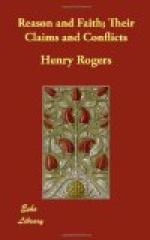____
* It may be as well to remark, that we have frequently observed a disposition to represent the very general abandonment of the theory of ‘verbal inspiration’ as a concession to Rationalism; as if it necessarily followed from admitting that inspiration is not verbal, that therefore an indeterminate portion of the substance or doctrine is purely human. It is plain, however, that this is no necessary consequence: an advocate of plenary inspiration may contend, that, though he does not believe that the very words of Scripture were dictated, yet that the thoughts were either so suggested, (if the matter was such as could be known only by revelation,) or so controlled, (if the matter were such as was previously known,) that (excluding errors introduced into the text since) the Scriptures as first composed were—what no book of man ever was, or can be, even in the plainest narrative of the simplest events—a perfectly accurate expression of truth. We enter not here, however, into the question whether such a view of inspiration is better or worse than another. We are simply anxious to correct a fallacy which has, judging from what we have recently read, operated rather extensively. Inspiration may be verbal, or the contrary; but, whether one or the other, he who takes the affirmative or negative of that question may still consistently contend that it may still be plenary. The question of the inspiration of the whole or the inspiration of a part, is widely different from that as to the suggestion of the words or the suggestion of the thoughts. But these questions we leave to professed theologians. We merely enter our protest against a prevailing fallacy.
____
Nor will the theory of what some call the ’intuitional consciousness avail us here. It is true, as they assert, that the constitution of human nature is such that, before its actual development, it has a capacity of developing to certain effects only,—just as the flower in the germ, as it expands to the sun, will have certain colours and a certain fragrance, and no other;—all which, indeed, though not very new or profound, is very important. But it is not so dear that it will give us any help on the present occasion. We have an original susceptibility of music, of beauty, of religion, it is said. Granted; but as the actual development of this susceptibility exhibits all the diversities between Handel’s notions of harmony and those of an American Indian—between Raphael’s notions of beauty and those of a Hottentot—between St. Paul’s notions of a God and those of a New Zealander—it would appear that the education of this susceptibility is at least as important as the susceptibility itself, if not more so; for without the susceptibility itself, we should simply have no notion of music, beauty, or religion; and between such negation and that notion of all these which New Zealanders and Hottentots possess, not a few of our species would probably prefer the former. It




